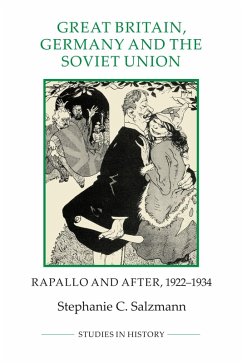Germany and the Soviet Union concluded the treaty of Rapallo together within five years of their defeat in the First World War. The resulting fear of Soviet-German co-operation cast a long shadow over British foreign policy; thisbook traces its influence.
The treaty of Rapallo, concluded in 1922 between Germany and the Soviet Union, the two vanquished powers of the Great War, ranks high among the diplomatic coups de surprise of the twentieth century. Its real importance, however, lies in the repercussions of the alliance on the subsequent policies of the two victorious powers, Britain and France. This study examines the impact of Rapallo on British foreign policy between 1922 and 1934, when the German-Soviet relationship had virtually ended. The "ghost of Rapallo" is the central theme of this story, as ever since the treaty's conclusion Rapallo has been a byword for Soviet-German secret and potentially dangerous collaboration. This book describes how the British viewed the Rapallo co-operation, how they dealt with this special relationship, and how the lingering memory of Rapallo affected British policy for decades to come. While examining a particular aspect of international relations it throws additional light on broader topics of European relations in the 1920s and early 1930s.
Dr STEPHANIE SALZMANN completed her PhD at Trinity Hall, Cambridge.
The treaty of Rapallo, concluded in 1922 between Germany and the Soviet Union, the two vanquished powers of the Great War, ranks high among the diplomatic coups de surprise of the twentieth century. Its real importance, however, lies in the repercussions of the alliance on the subsequent policies of the two victorious powers, Britain and France. This study examines the impact of Rapallo on British foreign policy between 1922 and 1934, when the German-Soviet relationship had virtually ended. The "ghost of Rapallo" is the central theme of this story, as ever since the treaty's conclusion Rapallo has been a byword for Soviet-German secret and potentially dangerous collaboration. This book describes how the British viewed the Rapallo co-operation, how they dealt with this special relationship, and how the lingering memory of Rapallo affected British policy for decades to come. While examining a particular aspect of international relations it throws additional light on broader topics of European relations in the 1920s and early 1930s.
Dr STEPHANIE SALZMANN completed her PhD at Trinity Hall, Cambridge.
Dieser Download kann aus rechtlichen Gründen nur mit Rechnungsadresse in A, D ausgeliefert werden.


